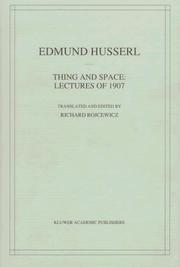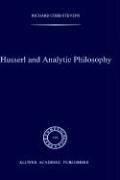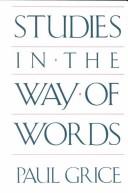| Listing 1 - 3 of 3 |
Sort by
|

ISBN: 0792347498 9780792347491 Year: 1997 Volume: 7 Publisher: Dordrecht ; Norwell, MA : Kluwer,
Abstract | Keywords | Export | Availability | Bookmark
 Loading...
Loading...Choose an application
- Reference Manager
- EndNote
- RefWorks (Direct export to RefWorks)
This is a translation of Edmund HusserI's lecture course from the Summer semester 1907 at the University of Gottingen. The German original was pub lished posthumously in 1973 as Volume XVI of Husserliana, Husserl's opera omnia. The translation is complete, including both the main text and the supplementary texts (as Husserliana volumes are usually organized), except for the critical apparatus which provides variant readings. The announced title of the lecture course was "Main parts of the phenome nology and critique of reason." The course began with five, relatively inde pendent, introductory lectures. These were published on their own in 1947, bearing the title The idea ojphenomenology.l The "Five Lectures" comprise a general orientation by proposing the method to be employed in the subsequent working out of the actual problems (viz., the method of "phenomenological reduction") and by clarifying, at least provisionally, some technical terms that will be used in the labor the subsequent lectures will carry out. The present volume, then, presents that labor, i.e., the method in action and the results attained. As such, this text dispels the abstract impression which could not help but cling to the first five lectures taken in isolation. Accord ingly, we are here given genuine "introductory lectures," i.e., an introduction to phenomenology in the genuine phenomenological sense of engaging in the work of phenomenology, going to the "matters at issue themselves," rather than remaining aloof from them in abstract considerations of standpoint and approach.
Theory of knowledge --- Espace et temps --- Fenomenologie --- Mind --- Object (Filosofie) --- Object (Philosophy) --- Objet (Philosophie) --- Perceptie (Filosofie) --- Perception (Philosophie) --- Perception (Philosophy) --- Phenomenology --- Phénoménologie --- Raison --- Rationaliteit --- Rationality --- Rationalité --- Reason --- Rede --- Ruimte en tijd --- Space and time --- Space of more than three dimensions --- Space-time --- Space-time continuum --- Space-times --- Spacetime --- Temps et espace --- Tijd en ruimte --- Time and space --- Waarneming (Filosofie) --- Phenomenology. --- Reason. --- Space and time. --- Fourth dimension --- Infinite --- Metaphysics --- Philosophy --- Space sciences --- Time --- Beginning --- Hyperspace --- Relativity (Physics) --- Intellect --- Rationalism --- Philosophy, Modern --- Object (Philosophy). --- Perception (Philosophy). --- Phénoménologie

ISBN: 0792304675 9401073422 9400918887 9780792304678 Year: 1990 Volume: 116 Publisher: Dordrecht ; Boston, MA ; London : Kluwer,
Abstract | Keywords | Export | Availability | Bookmark
 Loading...
Loading...Choose an application
- Reference Manager
- EndNote
- RefWorks (Direct export to RefWorks)
The principal differences between the contemporary philosophic traditions which have come to be known loosely as analytic philosophy and phenomenology are all related to the central issue of the interplay between predication and perception. Frege's critique of psychologism has led to the conviction within the analytic tradition that philosophy may best defend rationality from relativism by detaching logic and semantics from all dependence on subjective intuitions. On this interpretation, logical analysis must account for the relationship of sense to reference without having recourse to a description of how we identify particulars through their perceived features. Husserl' s emphasis on the priority and objective import of perception, and on the continuity between predicative articulations and perceptual discriminations, has yielded the conviction within the phenomenological tradition that logical analysis should always be comple mented by description of pre-predicative intuitions. These methodological differences are related to broader differences in the philosophic projects of analysis and phenomenology. The two traditions have adopted markedly divergent positions in reaction to the critique of ancient and medieval philosophy initiated by Bacon, Descartes, and Hobbes at the beginning of the modern era. The analytic approach generally endorses the modern preference for calculative rationality and remains suspicious of pre-modern categories, such as formal causality and eidetic intuition. Its goal is to give an account of human intelligence that is compatible with the modern interpretation of nature as an ensemble of quantifiable entities and relations.
Philosophy of language --- Theory of knowledge --- Husserl, Edmund --- Analyse (Filosofie) --- Analyse (Philosophie) --- Analyse linguistique (Philosophie) --- Analysis (Philosophy) --- Analysis [Linguistic ] (Philosophy) --- Analysis [Logical ] --- Analysis [Philosophical ] --- Analytical philosophy --- Analytische filosofie --- Fenomenologie --- Filosofische taalanalyse --- Intuitie --- Intuition --- Linguistic analysis (Filosofie) --- Linguistic analysis (Philosophy) --- Logical analysis --- Perceptie --- Perceptie (Filosofie) --- Perception --- Perception (Philosophie) --- Perception (Philosophy) --- Phenomenology --- Philosophical analysis --- Philosophie analytique --- Philosophy [Analytical ] --- Phénoménologie --- Psychologism --- Psychologisme --- Waarneming --- Waarneming (Filosofie) --- Husserl, Edmund, --- Phenomenology. --- Psychologism. --- Perception. --- Intuition. --- 1 HUSSERL, EDMUND --- Academic collection --- #GROL:SEMI-1-05'19' Huss --- Phenomenological psychology --- Philosophy, Modern --- Supraliminal perception --- Cognition --- Apperception --- Senses and sensation --- Thought and thinking --- Intuition (Psychology) --- Intuitionalism --- Insight --- Analysis, Linguistic (Philosophy) --- Analysis, Logical --- Analysis, Philosophical --- Analytic philosophy --- Philosophy, Analytical --- Language and languages --- Methodology --- Philosophy --- Logical positivism --- Semantics (Philosophy) --- Filosofie. Psychologie--HUSSERL, EDMUND --- 1 HUSSERL, EDMUND Filosofie. Psychologie--HUSSERL, EDMUND --- Analysis (Philosophy). --- Phénoménologie --- Husserl, Edmond --- Husserl (edmund), philosophe allemand, 1859-1938 --- Critique et interpretation --- Philosophie analytique.

ISBN: 0674852710 0674852702 9780674852716 9780674852709 Year: 1989 Publisher: Cambridge (MA) ; London : Harvard University Press,
Abstract | Keywords | Export | Availability | Bookmark
 Loading...
Loading...Choose an application
- Reference Manager
- EndNote
- RefWorks (Direct export to RefWorks)
Analysis (Philosophy) --- Language and languages --- Logic. --- Meaning (Philosophy) --- Perception (Philosophy) --- Semantics (Philosophy) --- Philosophy. --- -Logic --- Intension (Philosophy) --- Logical semantics --- Semantics (Logic) --- Semeiotics --- Significs --- Syntactics --- Unified science --- Argumentation --- Deduction (Logic) --- Deductive logic --- Dialectic (Logic) --- Logic, Deductive --- Analysis, Linguistic (Philosophy) --- Analysis, Logical --- Analysis, Philosophical --- Analytic philosophy --- Analytical philosophy --- Linguistic analysis (Philosophy) --- Logical analysis --- Philosophical analysis --- Philosophy, Analytical --- Foreign languages --- Languages --- Philosophy --- Philosophy of language --- Logic --- Logic, Symbolic and mathematical --- Logical positivism --- Meaning (Psychology) --- Philosophy, Modern --- Semiotics --- Signs and symbols --- Symbolism --- Definition (Philosophy) --- Intellect --- Psychology --- Science --- Reasoning --- Thought and thinking --- Methodology --- Analysis (Philosophy). --- Meaning (Philosophy). --- Perception (Philosophy). --- Semantics (Philosophy). --- Philosophie analytique --- Langage et langues --- Logique --- Signification (Philosophie) --- Sémantique (Philosophie) --- Perception (Philosophie) --- Philosophie --- Languages - Philosophy. --- Language and languages - Philosophy. --- Analyse (filosofie). --- Betekenis (filosofie). --- Logica. --- Perceptie (filosofie). --- Semantiek (filosofie). --- Taalfilosofie. --- Language and languages - Philosophy
| Listing 1 - 3 of 3 |
Sort by
|

 Search
Search Feedback
Feedback About UniCat
About UniCat  Help
Help News
News